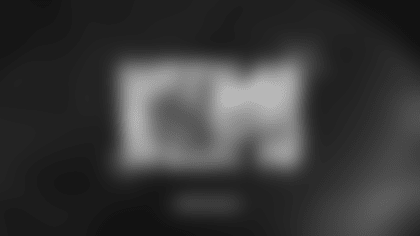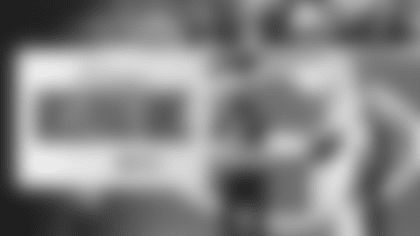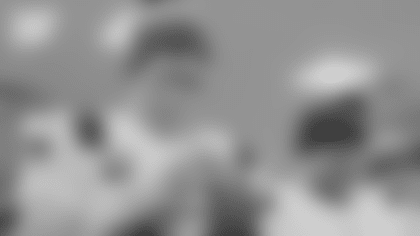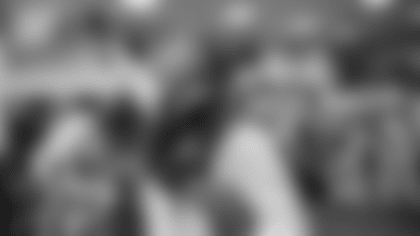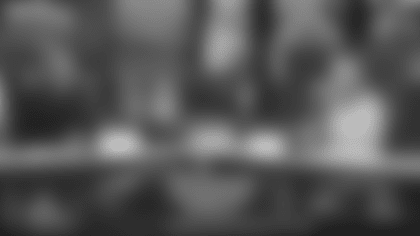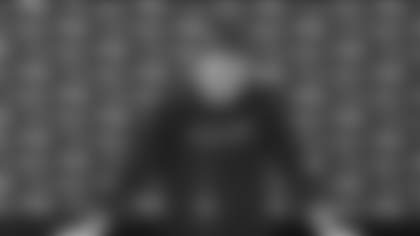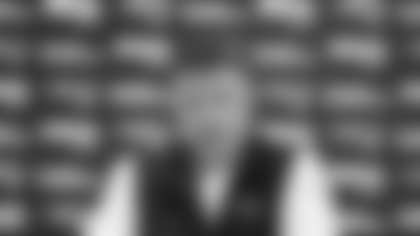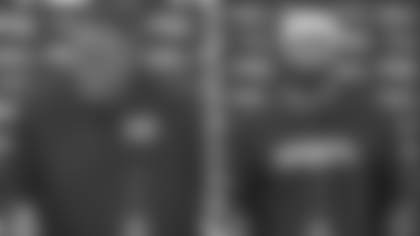BB: Alright, well, these division games are coming one right after another now. So, been very impressed watching Buffalo here all week. They're a tough, hard-nosed football team - tough team to play against. They do a really good job of their execution, make you work for everything. It will be tough up there, so we've got to have a good day today, be ready to go on Sunday, be ready to play 60 minutes. This team plays hard all the way through.
Q: You have spoken about how this is a smart Bills team. How does that show up when you watch film?
BB: I mean, they do a lot of things really well. Like last week's game against Kansas City - Kansas City's got a good punter. They got no yards on punt return. [Brandon] Tate got 60. I mean, that's a big swing right there. So, you know, little things like that, whether it's plays in the kicking game, whether it's situationally - they're very aware situationally of what they need to do in that situation, regardless of what the play is. You see the players execute in the situation, whether it's the end of the half, time, score, yards they need, yards they need to defend against, getting into field goal range, keeping a team out of field goal range - you know, just a lot of little things that they're not little, but they're a good situational team. They're a smart team. Again, they make you earn everything. They had a couple penalties in the Kansas City game. I mean, they were tough calls. It wasn't you look at the player and say, 'Why did he do that?' I mean, they got called for a penalty, but it was a tough call. They were probably doing the same thing we would tell our player to do. They do a good job - well-coached.
Q: Is it difficult to find the things Kyle Van Noy is best at since he is such a versatile player? Or is it just a perk to have a guy that can play so many positions?
BB: Well, I think we've had enough experience with Kyle to know the things he does well. We try to put him in those situations. He does a lot of things well. It's not just one thing, but we try to put him in those situations the best we can. I mean, we don't know what the play's going to be, so you have to defend what they do. So, from a responsibility standpoint, there's a lot of things that could happen on every play at any position. I mean, a player has got to be able to handle multiple responsibilities. I don't care what position he plays, especially defensively. Offensively, you can control the play. I mean, if you want to throw a screen pass, call a screen pass. But, when you're playing defense, you don't know whether it's a screen pass, a run, a drop back pass, a double-team block. You don't know what it is, so you've got to be able to play your responsibilities on whatever the play is that they run.
Q: Have you been impressed by Van Noy's ability and willingness to move around in the defense?
BB: Yeah, absolutely. Kyle's a smart guy and it seems like he kind of enjoys that - doing something maybe a little bit different this week. He's a good communicator, so he's good at getting other people around him coordinated or in the right spot. Or, if we need to make a call, he'll make the call. He's decisive and will make it with good judgement but also make it decisively so everybody has confidence in it when we go out there and execute it. So, he does a good job of that and that's one of the maybe advantages to having him in different positions and he understands. Because he's played other spots, he understands what that person needs to know or maybe what the stress is on - if he's a defensive end, he knows what the stress is on the inside linebacker and vice versa and so forth. That probably helps him with that process.
Q: Van Noy's role seems to be comparable to the one Rob Ninkovich and Mike Vrabel had. Is that one of the more difficult positions on your defense to learn and play?
BB: I think that's fair. Yeah, and again, everybody doesn't have to be able to do 11 different things. It's good to have guys that can do one thing really well. That's great. But, somewhere along the line, with the variety of offenses that we see and different formations, from big formations to spread formations to sometimes there are no backs in the game, sometimes there are no tight ends in the game, sometimes there could be two or three of either - again, there's a lot of different variables, so for somebody to be able to have some versatility to help us handle those multiple situations, that's a lot easier than having to send other guys on and off the field and try to get them matched up and so forth if you can just move one or two players around to do that. So, guys like Kyle and Pat Chung, Devin [McCourty], guys that give us linebacker to safety, linebacker to defensive end - those kind of, I would say, comparable spots, depending on what we're facing, there's a lot of value to that. But, like I said, we don't need 11 people that have to be able to do that. If we have a guy that can two-gap and control the blocker on the line of scrimmage, that's great. We don't need him to adjust to 0-1 personnel.
Q: What goes into playing the punt protector role that Nate Ebner played on your punt unit?
BB: Yeah, that's one of the toughest spots to play. It doesn't come up every play. I'm not saying it's - it's kind of like playing quarterback, but you play quarterback for, call it 60 plays a game, 70 plays a game. You only punt five to 10 times, let's call it - somewhere in there. But, there's a lot of different variables. You know, if it's eight-on-eight, then it's getting the right eight-on-eight. Now, if you split your gunners out and a guy comes in from the outside, now they have nine-on-eight, and that creates some problems. You also want to try to be able to maximize your coverage, so let's say there's only six guys rushing and you have eight blockers, right - seven plus the personal protector. If you can block those six with six and then have two free guys going to the ball, particularly if it's the two guys that are your best coverage players or two of your best coverage players, there's some strategy there, too. So, identifying the rush, identifying the return - sometimes you can tell what the return is based on the way they align - or if there's a double team on the gunner or not a double team on the gunner, a lot of times the wind plays into that. Sometimes the situation plays into it. Teams that like field returns are bound to return in certain situations, or middle returns in certain situations, like plus-50, things like that. So, there are a lot of variables there, but a good personal protector takes all those into consideration, just like a quarterback does, and A, protect the punter, B, he's the last line of defense. So, a lot of times, even if your protection is not right on the front, if that guy gets the right guy and does the right thing, you still could possibly save a blocked punt by just him doing the right thing, even though somebody else has made a mistake in the front of it. So, that decision making is a key part of it there, and the whole cadence and communication between the snapper, the punter and the gunners if we directional punt - if we're trying to punt the ball one way or the other, making sure that everybody knows where that is and if it changes, which sometimes it does based on the look that they give you. So, there's a lot of different things that go in there. It's not an easy job at all if you want to do it right and get the most out of it. So, we've had a number of guys do that - Pat's done it for us, Jordan's [Richards] done it for us, obviously Nate did a great job of it. Those guys all meet together and work together, just like the quarterbacks do. They all learn the same things so that they all understand what the options are, and what's a good option against one team might be a bad option against another team. It frequently is. We wouldn't always necessarily do it by the book. It would depend on what the look was and who the people are on the other side of the ball, who we're facing. So, the plus-50 punting game where they leave their defense on the field and don't put a punt return team out there, that creates a whole other set of problems that you have to deal with on the punt team. The size and the type of player that's rushing is a lot different than, a lot of times, the player that's on the punt return team and the rushers they would use would be different. So, that creates another element of it, too. A lot goes into that position. It's a tough position to play, as I said. I'm not trying to say it's like playing quarterback. You don't do it 70 times a game, but the times you do it, it could be a team like Buffalo that gives you some different looks, Miami that gives you a lot of different looks. It's challenging.
Q: In a Sound FX video of you from last week's game, you remained pretty stoic on the sideline after each touchdown. Is that normally how you react when your team scores?
BB: Yeah, I don't know. I mean, I'm happy when we score. I'm really happy when we score, but there's a decision to be made on the next play and the next play and the next series. Now the game has changed. Either we narrow the gap or widen the gap or whatever it is. So, then there's something that has to be done going forward. That's really a big part of my job. So, we have a lot of fans that come to the game. They cheer. They do a great job. I feel like a big part of my job is decision making and planning ahead for the next play, the next series, the next situation. There is, sometimes, a little bit of time between a score and the kickoff when you go out on defense or how you're going to kick the ball off or so forth that I feel like I need to do a good job at that. I don't want to let the team down in the responsibilities that I have.
Q: When you sign a player like Rex Burkhead who did not have many offensive snaps during his pro career, how much of your evaluation is going back to look at what you thought of him in the pre-draft process?
BB: A little bit, but I mean, in Rex's case, he played four years. At the end of the year last year, he played, I don't know, four or five games - whatever it was - six games. I mean, I think there was plenty in this league to go on. There was enough for us to go on in this league. I don't think we relied too much on Nebraska, although that was good. That was all good and the pre-draft process with him and what we knew about him as a person, as a player, his work ethic and toughness and intelligence and all that, I mean, that was all positive. But, we obviously didn't have any interaction with him while he was in Cincinnati, so I think that's kind of what you rely on are those kind of intangibles, if you will. I think his performance on the field, there was enough of it you could evaluate it, not as a 16-game starter - I mean, he didn't have that opportunity - but the plays that he played, I think you could evaluate whether he could run routes, catch the ball, whether he had good vision, if he had good ball security, whether he could make guys miss, whether he had power and so forth. There was enough to evaluate that on, I felt.
Q: Whether as a gunner or a corner, it seems like Jonathan Jones' ability to compete through the play is something that stands out. Is that something that you noticed in the evaluation process with him?
BB: Absolutely, yeah. John plays bigger - bigger than his size, what it looks like - and he plays hard and he does a really good job of finishing plays, like you said, whether that's covering kicks, blocking gunners, playing the deep ball, finishing on the ball when the receiver is in the process of catching it, tackling, all those things. He does a real good job. I thought the play he had last week was a really good play where he came free on the blitz and then broke down and made a tackle on [Matt] Moore and was under control and came to balance - plays like that where we've all seen guys miss those plays. That was a good example of just a one-on-one open field space tackle that he executed very well, but we've seen him do that on a lot of deep balls this year and in the kicking game over the last two years.
Q: Did Jones have much experience in the slot prior to this season?
BB: Well, all of our corners play a little bit of everywhere. We do that in training camp for situations that could come up during the year, so then if we do it, it's not the first time. He did some of it last year. He's done more of it this year. Yeah, he's done more of it this year.
Q: What makes Jerry Hughes one of the better edge defenders?
BB: He's explosive, he's got a good first step, he's got good pad level, good leverage, he gets under or through a lot of blocks - hand blocks, punches - athletic, runs well. His spin move, his inside move - he's fast on games when he comes up and under with the tackle, with the twist game with the tackle. He's got an explosive burst off that. But, I'd say the main thing is his get-off, his ability to get the edge and force the tackle to stretch out there to get him, which is hard, and then when they do that, then he's got the quickness and the agility to either come up and under or turn that speed into a power rush and collapse the tackle back into the quarterback.
Q: What were your production meetings like with Jim Nantz and Phil Simms, and how much do you miss the connection with Phil given your history with him? What has it been like this year meeting with Nantz and Tony Romo?
BB: Well, I think Phil did a great job and I always enjoyed Phil. Even though I never really coached Phil, Phil was the quarterback and I was the defensive coordinator. We talked a lot. We had, I thought, a real good relationship with the Giants. We talked a lot about coverages and schemes and what do you see and how can I help you, how can you help me type of thing. Phil was great that way, and he's very knowledgeable. Phil was a very knowledgeable player that even things like the kicking game - which as a quarterback, you're not really a part of - Phil was always interested in. I actually involved him in it in different things, facets of that when I was with the Giants. Even though Phil throws the ball right-handed, everything else he does in his life is left-handed, including punt. So, when we had the great right-footed punters at the Giants, Dave Jennings and Sean Landeta, when we went up against a left-footed punter, Phil was my go-to guy there. So, things like that that he was always very accommodating and helpful, but he always had an interest in it, too. So, I thought he - honestly, I didn't hear a lot of the games that he did for us, but I heard other games that he did and I always thought he gave a lot of great insight into the game, not just from a quarterback's perspective but from a team standpoint. So, yeah, I do miss seeing him multiple times during the season when he would have our games. Tony, I'd say, is similar - a very inquisitive guy with a good history of the game. He's asked a lot of questions about when I was with the Giants or the '70s or the '80s or Tom Landry or so forth. He's pretty knowledgeable for a player that wasn't in that era that he knows a lot about it and has obviously read and studied it. He sees a lot of things - a lot of fine points of a defensive scheme or a play that, I'd say, a lot of guys that I talk to don't - and asks about those and, 'What was this guy reading on this and why did this guy do that and was this guy's job on this play to do something that is kind of subtle?' He picks up on those things and, I'd say, asks a lot of very detailed, coaching, technical-type questions that you don't get in a lot of those meetings. But, he's good. I've enjoyed working with him.
Q: When it was Nantz and Simms calling the games, did it get to a point where it was like, 'Oh, you guys again?' Did it almost feel like a routine?
BB: Almost like doing the radio show with [Scott] Zolak, the weekly radio show. Well, yeah, I'd say when we had those meetings, sometimes when you do say like a Fox crew who only does our one game a year - 'How are you using your tight ends? How's this guy rotating in? What's this guy's role? Where does he play?' It wasn't like that with those guys. They saw enough games that they knew kind of what everybody's role was, what this guy played because somebody else was hurt, this guy played because you used a different package that week, and so forth. So, that part of it I'd say they were very on top of, probably as much as any TV crew we've had. It would be more specific to, 'Alright, what are you going to do this week? How are you going to handle this? How are you going to handle that? What do you think of this part of their game or how are you going to attack that part?' So, it was much more specific, not that I don't get those from other crews, but I would say there wasn't the, 'Who's your backup slot receiver?' They knew who that was.
Q: Sean McDermott talked this week about trying to establish a culture in Buffalo. What was the biggest challenge for you when arrived and wanted to establish a culture here?
BB: Well, I'd say, in all honesty, Phil [Perry], that's probably a question for another day. It's a good question, and I followed two great coaches in here with Bill [Parcells] and Pete [Carroll]. So, a lot of things that were established or in play, in one way or another - two great coaches, one of which I was a part of, so I had a lot of familiarity with what we did in '96. So, it was a lot of things involved. I mean, in the end, it comes down to winning. Once you establish that you can win, then that changes your program from not being a winning program to being a winning program, and that's all the difference in the world. I'd say it's a great question, so probably for another day and a longer story. Right now, I'm kind of trying to get ready to go this week against Buffalo and we need to play well up there. It's going to be a big challenge for us, so just going to put our attention there.






